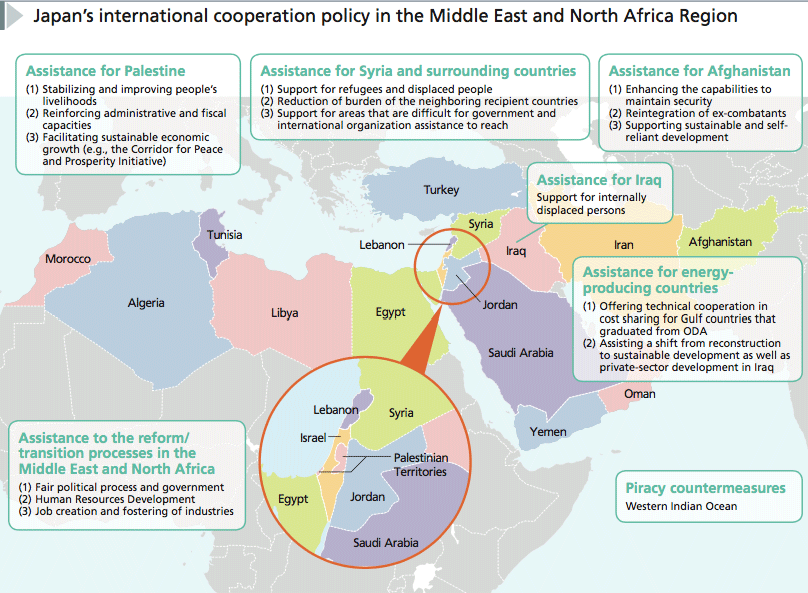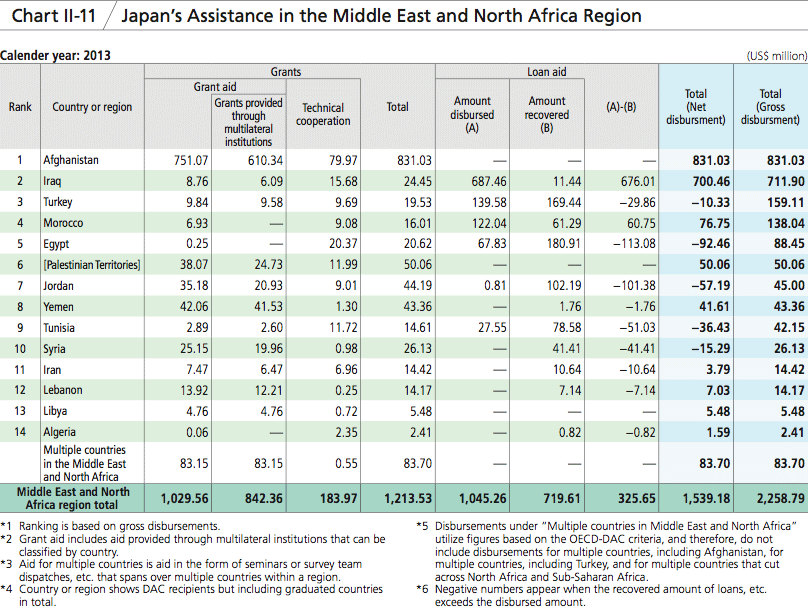4. Middle East and North Africa
The Middle East and North Africa region is a major supply center for the world's energy; it accounts for approximately 50% of both the world's oil and natural gas reserves. Japan depends on the Middle East and North Africa for over 80% of its crude oil imports, and the core sea trading routes linking Japan and Europe pass through the region. Thus, the Middle East is an exceptionally critical region for Japan's economy and energy security as well.
The region experienced major political upheaval from 2011. The democratization process is proceeding in the countries where longstanding regimes collapsed. However, economic and social conditions still have not improved, and the real fight for reform lies ahead. Encouraging reform efforts in such countries through financial assistance and contributing to stability in the region leads to peace and stability not only in those countries and their neighbors, but also in the entire world.
Some countries in the region still face unstable situations. In Syria, suppression and violence are continuing even after three years have passed since March 2011, generating significant numbers of refugees and displaced persons. In addition, in August 2013, chemical weapons were used in the country, resulting in the death of many civilians. Such situations caused serious humanitarian issues. In 2014, the activities of the Islamic State of Iraq and the Levant (ISIL), which extends across national borders in Iraq and Syria and has declared the establishment of a self-proclaimed “state,” pose a grave threat to international order.
Moreover, it is the feature of the region that there are many countries which continue to see high economic growth with large young populations, and it is important to support these promising countries so that they can continue to achieve stable growth.
< Japan's Efforts >
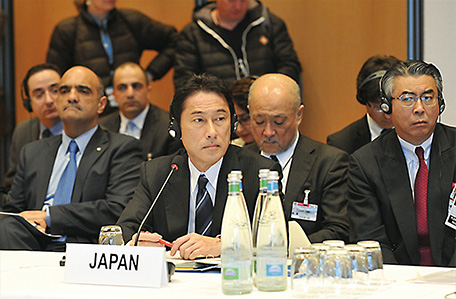
Minister for Foreign Affairs Fumio Kishida at the International Conference on Syria (the Geneva II Conference) held in Montreux, Switzerland, in January 2014.
In the Middle East and North Africa, there are many countries and regions with devastated living and social infrastructure and security problems including the Palestinian issue, Afghanistan and Iraq. Since peace and stability in these countries and regions may have a major impact on the stability and prosperity of the region and the international community as a whole, it is vital for the international community to support these countries and regions for the achievement of sustainable peace and stability, nation-building, and national reconstruction. With this view of such characteristics of the Middle East and North Africa, there is significant meaning in Japan's proactive support.
The Middle East and North Africa have experienced major political upheaval since 2011. At the G8 Deauville Summit (France) in May 2011, the leaders referred to the transformational movements under way in this region as the “Arab Spring.” On this basis, the leaders welcomed this historic transformation and affirmed that the G8 would support these efforts.
In May 2013, during his visit to Saudi Arabia, Prime Minister Shinzo Abe declared that Japan would fundamentally strengthen the relationship between Japan and the Middle East to build the “Comprehensive Partnership toward Stability and Prosperity.” The Prime Minister also announced that Japan would provide assistance totaling $2.2 billion to support regional stabilization and democratization, and that a new scheme called cost-sharing technical cooperation* would be launched. The Prime Minister also concurred that Japan would strengthen industrial and human resources development in the region.
With regard to the situation in Syria, an issue of concern to the international community, Japan announced additional humanitarian assistance totaling approximately $120 million at the Second International Humanitarian Pledging Conference for Syria (“Kuwait II” Conference) held in Kuwait and the Geneva II Conference on Syria held in Switzerland in January 2014. This has brought the total of Japan's humanitarian assistance to Syria and neighboring countries to approximately $400 million.
In September 2014, Japan unveiled $50 million of emergency assistance to respond swiftly to the Middle East's humanitarian crises, and with ISIL and other extremist groups stepping up activities in the region, to help prevent extremism from taking root.
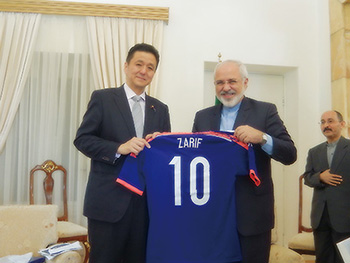
Former State Minister for Foreign Affairs Nobuo Kishi, presenting a uniform of Japan National Team for the World Cup to Minister of Foreign Affairs Mohammad Javad Zarif, which has Mr. Zarif's name printed, during his visit to the Islamic Republic of Iran in June 2014. |
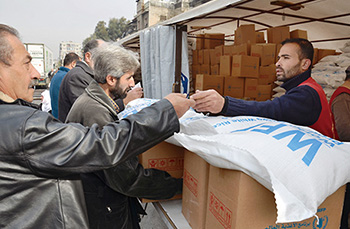
Local residents receiving cardboard boxes containing cooking oil and other goods and bags of rice in a food distribution tent in Damascus, Syria, in December 2014. (Photo: Kyodo News) |
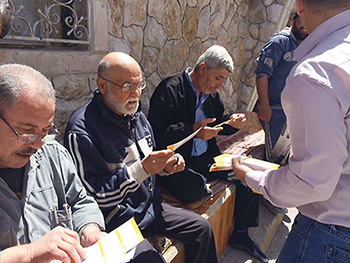
Forsati campaign in a refugee camp in Irbid Governorate in Northern Jordan. Forsati means “my chance.” This initiative aims to promote change in women's negative attitude towards finding a job by distributing posters and leaflets. (Photo: Maki Niioka / JICA) |
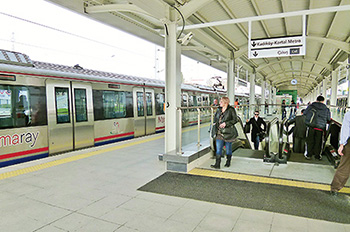
Bosphorus Rail Tube Crossing (Marmaray project) was completed in October 2013 through ODA loans. Train passengers on a Sunday morning at the Ayrilikcesme station in Istanbul, Turkey. (Photo: Satoe Sawada / JICA Turkey Office) |
- *Cost-sharing technical cooperation
- This refers to technical cooperation for countries that have graduated out of ODA but are found to have economic or social circumstances in which development challenges still require Japan's assistance. In principle, the necessary costs are borne by the partner government. Its purpose is to contribute to the partner country's socio-economic development and to maintain and deepen amicable bilateral relations between Japan and such countries, by providing them with Japan's high quality technologies, knowledge, and experience which draw on the experience Japan has gained through its past economic cooperation through JICA.
| Morocco
Business Development Advisor
Dispatch of Cooperation Experts (August 2013 – Ongoing)
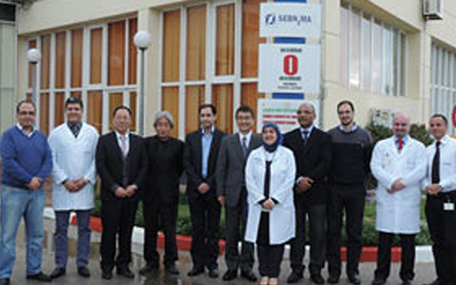
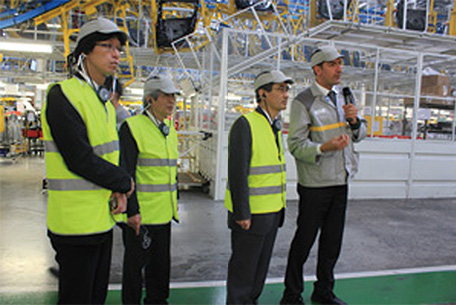
Visit to a factory of a Japanese company in the Tangier Free Zone in Morocco. (Above: Sumitomo Wiring Systems' factory, below: Renault-Nissan's factory) (Photo: Shizuo Empuku, an expert / JICA)
Morocco, located in North Africa, actively promotes the inflow of foreign direct investment to enhance its economic growth and competitiveness as well as boost employment. The country also undertakes efforts to increase its export capacity by setting up “free zones” that offer preferential tax treatment, including export tax. In addition, Morocco has been promoting initiatives to improve its investment environment, such as establishing Comité National de l'Environnement des Affaires (CNEA) and Agence Marocainede de Développement des Investissements (AMDI)1.
Nonetheless, according to “Doing Business 20132” published by the World Bank, Morocco was 97th out of 185 countries in the rankings on the ease of doing business, suggesting that there is still room for improving its business environment. In particular, Morocco's unemployment rate of young people is nearly 30% and is one of the largest factors of social instability. In terms of expanding the pool of employers, it is a critical task for Morocco to attract the manufacturing industry, which can contribute significantly to securing employment.
Under such circumstances, the number of Japanese companies that have expanded their businesses to Morocco has increased to nearly 35, many of them being automobile-related companies. They have set up plants for export to Europe, and have been making a large contribution to improving the employment situation of local people. The Government of Morocco hopes that more Japanese companies will invest in Morocco. In response to such expectations, Japan started the dispatch of business development advisors in August 2013 to support AMDI's initiatives to attract Japanese companies to Morocco. The advisors provide support for the organizational capacity building of AMDI to ensure that it can provide appropriate information and consultation to Japanese companies that are considering investing in or have already expanded their businesses in Morocco. The dispatch of advisors is being implemented based on one of the measures that were included in Japan's assistance package announced during the Fifth Tokyo International Conference on African Development (TICAD V) in 2013 under “boosting economic growth,” namely, dispatching industrial policy advisors to ten African countries.
(As of August 2014)
*1 English: Moroccan Investment Development Agency (MIDA)
*2 The World Bank, “Doing Business 2013,” TABLE 1.1 Rankings on the ease of doing business
| Yemen
Electoral Systems and Election Management
Country focused training (April 2013 – Ongoing)
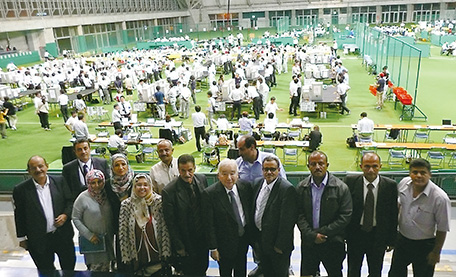
Trainees visiting the site to see how votes were counted at the mayoral election and bi-election of the councilor of Okayama Prefecture, Japan (Photo: The Institute for Political Studies in Japan)
The so-called “Arab Spring1” also affected Yemen. Its politics fell into disarray in February 2011, and this triggered armed conflicts. As a result, in February 2012, the Saleh regime collapsed after more than 30 years in power, and a new president was elected. Since March 2013, a national dialogue involving a wide range of Yemeni citizens from all walks of life was promoted under the new president. Opinions gathered through the dialogue were compiled into an outcome document in January 2014. The political transition in Yemen, including the formulation of a new constitution and the election of the president and the members of the Parliament, will take place based on the outcome document. Japan has been actively providing support for this process, which is vital for the democratization of Yemen following its political change, as it will guide the stability and development of the country.
Training on electoral systems and election management is provided for trainees affiliated with the election commission and other organizations in Yemen. The objective is to equip trainees with knowledge on (i) a sound and functional Parliament that is open to the public, (ii) methods for administering free and democratic elections, and (iii) the establishment of fair and neutral media, which are all required of a democratic state. In the first year, training was provided to 12 trainees. The curriculum included an observation of the mayoral election and the by-election of the councilor of Okayama City, Japan, ranging from pre-election day preparations to voting and vote counting, as well as mock voting by trainees. Through such experiences, the trainees were able to understand first-hand how the processes they learned in the lectures are implemented in practice.
It is expected that after returning to Yemen, the trainees and other relevant Yemeni stakeholders will utilize the knowledge they gained from the training to further promote discussions and initiatives aimed at the democratic administration of the Parliament and the development of an electoral system in Yemen.
(As of August 2014)
*1 A term coined to refer to the democratization movement that occurred in Arab countries from the end of 2010 to 2011.
